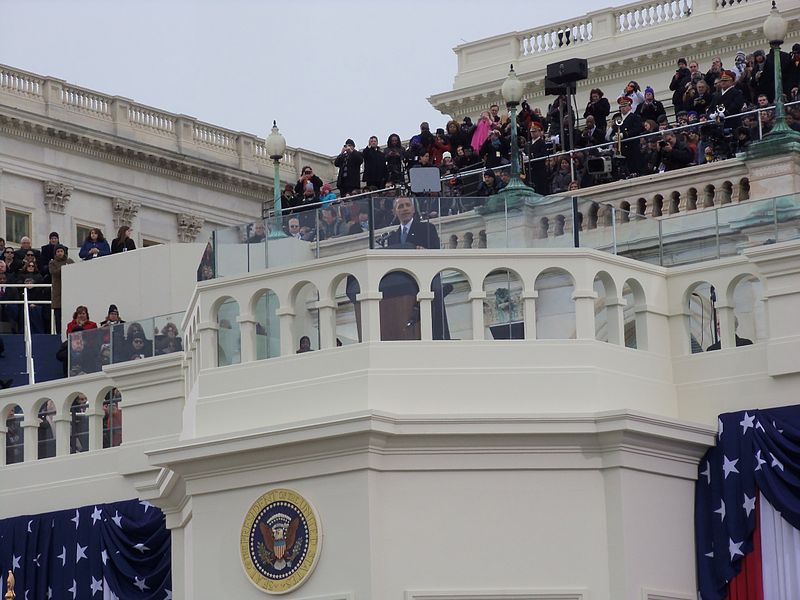Inauguration Speech
 Most likely any high school student enrolled in a US history course across the country has written an essay on one of the many great speeches delivered—typically at inaugurations—by past presidents. Washington, in his farewell address, warned of foreign entanglements. Lincoln called for reconstruction along equal lines between northern and southern states. Franklin D. Roosevelt declared “war” on the Great Depression. This is just a short list of many great bookend speeches given by our past presidents. These bookend speeches offer a unique window into the time in which they were delivered, beautifully expressing the political imperatives, motivations, and trials of their era. These speeches transcend the day-to-day, muddy politics of Washington D.C. and explain our presidents’ broad strokes and grand visions.
Most likely any high school student enrolled in a US history course across the country has written an essay on one of the many great speeches delivered—typically at inaugurations—by past presidents. Washington, in his farewell address, warned of foreign entanglements. Lincoln called for reconstruction along equal lines between northern and southern states. Franklin D. Roosevelt declared “war” on the Great Depression. This is just a short list of many great bookend speeches given by our past presidents. These bookend speeches offer a unique window into the time in which they were delivered, beautifully expressing the political imperatives, motivations, and trials of their era. These speeches transcend the day-to-day, muddy politics of Washington D.C. and explain our presidents’ broad strokes and grand visions.
Obama, on January 21, delivered his own bookend speech in his second inaugural address. What is obvious is that his oration was filled with valiant and age old calls for the advancement of progressivism. Like all past inaugural addresses, however, Obama’s must be looked at through the context of his presidency as a whole. Obama is a progressive, by many metrics, from his social liberalism to his broad calls for broadening, or at least preserving, the entitlement safety net. However, President Obama’s progressivism cannot be limited to his, albeit well intentioned, calls for social liberalism. Rather, Obama’s progressivism, and ultimately his legacy, must be derived from his core outlook on statesmanship, governance, and America’s political heritage.
One phrase from his inauguration that helps us derive his core outlook on those factors perhaps went under the radar for those who heard the President’s speech. Obama’s correct analysis that “through it all, we have never relinquished our skepticism of central authority, nor have we succumbed to the fiction that all society’s ills can be cured through government alone” is the sentiment that I earnestly hope will come to define his progressivism and legacy.
At face value that may appear to be a rather self-evident statement. In reality, Obama correctly identifies what is perhaps one of the greatest underlying threads of American politics—the issue of government—and seeks to frame his stance on that debate.
Obama’s progressivism, as encapsulated in this phrase, is neither the belief that government is the problem nor that government is the solution. Obama has tried to do what is wholly unpopular in America—to look at the world in a non black and white, good empire vs. evil empire, and us vs. them mindset. Obama does not want big government nor does he want small government. Obama is a progressive because he strives to find what is the right amount of government. He believes that nuance is essential, that somewhere between the dogmatic and polarized ends of American political thought exists the truth and the right course of action.
To simplify, the common narrative, as told by many in the media and within D.C., is that one either supports big government—more spending, more programs, and more bureaucracy—or small government—less spending, less taxes, and less red tape.
Americans, or at least the proponents of these two common narratives, like to portray the world this simply. To Cold War hawks, the Soviet Union was a blatantly evil force. To Bush-era Neocons, Iran, Iraq, and North Korea formed an “axis of evil.” To those on the far left, Corporations are entirely profit seeking and inherently corrupt. Ronald Reagan cut taxes and therefore was a puppet of big business. The previous phrases are commonplace platitudes in America’s political dialogue.
The right government to Obama implies more money for education, infrastructure, and future investments. The right government for Obama also acknowledges necessary cuts to entitlements, tax reform, and defense spending cuts.
Obama’s quest for the right government is progressive, courageous, necessary, and pragmatic. For the 21st century, the United States needs neither a big government, drowning under the weight of unreformed tax codes and entitlement systems, nor a small government, with little investment and no compassion for those less fortunate in our society.
The United States, with the president’s leadership, must think beyond the common slogans of big government and small government, towards the perhaps eerie, unsettling, and hard-to-package prospect of the right government. To recount the trite phrase spoken by Franklin Roosevelt in his first inaugural address in 1933, the “only thing we have to fear is fear itself.” The American political process needs to mature, overcome its fear of nuance, and strive not for the packable solutions that are deliberately big or deliberately small, but rather those that are right.
